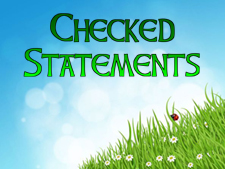In this chapter you will learn:
- What is the checked statement in C#?
- What is the benefit of using checked statement in C#?
- How to use checked statement in C# programming?
The checked statements force C# to raise exception whenever underflow or stack overflow exception occurs due to integral type arithmetic or conversion issues.
Example
using System;
using System.Collections.Generic;
using System.Linq;
using System.Text;
namespace Checked_Statement
{
class Program
{
static void Main(string[] args)
{
int num;
// assign maximum value
num = int.MaxValue;
try
{
checked
{
// forces stack overflow exception
num = num + 1;
Console.WriteLine(num);
}
}
catch (Exception e)
{
Console.WriteLine(e.ToString());
}
Console.ReadLine();
}
}
}
This program raises exception while executing because it is using checked statement that prevent the current execution when stack overflow exception appears.
Output
System.OverflowException: Arithmetic operation resulted in an overflow.
at Checked_Statements.Program.Main<String[] args> in C:Documents and Settings\Steven\My Documents\Visual Studio 2008\Projects\complete c# code\Chapter4\Checked Statements\Checked Statements\Program.cs:line 18
__Summary
In this chapter you learned what checked statement is and also learned how to use checked statement in C sharp programming. In next chapter you will learn about Unchecked Statement in C#.
 In this chapter you will learn:
In this chapter you will learn: